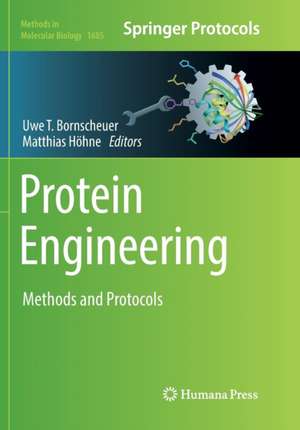Protein Engineering: Methods and Protocols: Methods in Molecular Biology, cartea 1685
Editat de Uwe T. Bornscheuer, Matthias Höhneen Limba Engleză Paperback – 23 mai 2018
Authoritative and cutting-edge, Protein Engineering: Methods and Protocols aims to aid scientists in the planning and performance of their experiments.
The chapter 'Functional Analysis of Membrane Proteins Produced by Cell-Free Translation' is open access under a CC BY 4.0 license via link.springer.com.
| Toate formatele și edițiile | Preț | Express |
|---|---|---|
| Paperback (1) | 491.88 lei 17-23 zile | +43.87 lei 5-11 zile |
| Springer – 23 mai 2018 | 491.88 lei 17-23 zile | +43.87 lei 5-11 zile |
| Hardback (1) | 741.54 lei 6-8 săpt. | |
| Springer – 30 oct 2017 | 741.54 lei 6-8 săpt. |
Din seria Methods in Molecular Biology
- 9%
 Preț: 791.59 lei
Preț: 791.59 lei - 23%
 Preț: 598.56 lei
Preț: 598.56 lei - 20%
 Preț: 882.95 lei
Preț: 882.95 lei -
 Preț: 252.04 lei
Preț: 252.04 lei - 5%
 Preț: 802.69 lei
Preț: 802.69 lei - 5%
 Preț: 729.61 lei
Preț: 729.61 lei - 5%
 Preț: 731.43 lei
Preț: 731.43 lei - 5%
 Preț: 741.30 lei
Preț: 741.30 lei - 5%
 Preț: 747.16 lei
Preț: 747.16 lei - 15%
 Preț: 663.45 lei
Preț: 663.45 lei - 18%
 Preț: 1025.34 lei
Preț: 1025.34 lei - 5%
 Preț: 734.57 lei
Preț: 734.57 lei - 18%
 Preț: 914.20 lei
Preț: 914.20 lei - 15%
 Preț: 664.61 lei
Preț: 664.61 lei - 15%
 Preț: 654.12 lei
Preț: 654.12 lei - 18%
 Preț: 1414.74 lei
Preț: 1414.74 lei - 5%
 Preț: 742.60 lei
Preț: 742.60 lei - 20%
 Preț: 821.63 lei
Preț: 821.63 lei - 18%
 Preț: 972.30 lei
Preț: 972.30 lei - 15%
 Preț: 660.49 lei
Preț: 660.49 lei - 5%
 Preț: 738.41 lei
Preț: 738.41 lei - 18%
 Preț: 984.92 lei
Preț: 984.92 lei - 5%
 Preț: 733.29 lei
Preț: 733.29 lei -
 Preț: 392.58 lei
Preț: 392.58 lei - 5%
 Preț: 746.26 lei
Preț: 746.26 lei - 18%
 Preț: 962.66 lei
Preț: 962.66 lei - 23%
 Preț: 860.21 lei
Preț: 860.21 lei - 15%
 Preț: 652.64 lei
Preț: 652.64 lei - 5%
 Preț: 1055.50 lei
Preț: 1055.50 lei - 23%
 Preț: 883.85 lei
Preț: 883.85 lei - 5%
 Preț: 1038.84 lei
Preț: 1038.84 lei - 5%
 Preț: 524.15 lei
Preț: 524.15 lei - 18%
 Preț: 2122.34 lei
Preț: 2122.34 lei - 5%
 Preț: 1299.23 lei
Preț: 1299.23 lei - 5%
 Preț: 1339.10 lei
Preț: 1339.10 lei - 18%
 Preț: 1390.26 lei
Preț: 1390.26 lei - 18%
 Preț: 1395.63 lei
Preț: 1395.63 lei - 18%
 Preț: 1129.65 lei
Preț: 1129.65 lei - 18%
 Preț: 1408.26 lei
Preț: 1408.26 lei - 18%
 Preț: 1124.92 lei
Preț: 1124.92 lei - 18%
 Preț: 966.27 lei
Preț: 966.27 lei - 5%
 Preț: 1299.99 lei
Preț: 1299.99 lei - 5%
 Preț: 1108.51 lei
Preț: 1108.51 lei - 5%
 Preț: 983.72 lei
Preț: 983.72 lei - 5%
 Preț: 728.16 lei
Preț: 728.16 lei - 18%
 Preț: 1118.62 lei
Preț: 1118.62 lei - 18%
 Preț: 955.25 lei
Preț: 955.25 lei - 5%
 Preț: 1035.60 lei
Preț: 1035.60 lei - 18%
 Preț: 1400.35 lei
Preț: 1400.35 lei
Preț: 491.88 lei
Preț vechi: 607.27 lei
-19% Nou
Puncte Express: 738
Preț estimativ în valută:
94.12€ • 98.53$ • 77.88£
94.12€ • 98.53$ • 77.88£
Carte disponibilă
Livrare economică 13-19 martie
Livrare express 01-07 martie pentru 53.86 lei
Preluare comenzi: 021 569.72.76
Specificații
ISBN-13: 9781493984633
ISBN-10: 1493984632
Ilustrații: XI, 350 p. 82 illus., 63 illus. in color.
Dimensiuni: 178 x 254 mm
Greutate: 0.68 kg
Ediția:Softcover reprint of the original 1st ed. 2018
Editura: Springer
Colecția Humana
Seria Methods in Molecular Biology
Locul publicării:New York, NY, United States
ISBN-10: 1493984632
Ilustrații: XI, 350 p. 82 illus., 63 illus. in color.
Dimensiuni: 178 x 254 mm
Greutate: 0.68 kg
Ediția:Softcover reprint of the original 1st ed. 2018
Editura: Springer
Colecția Humana
Seria Methods in Molecular Biology
Locul publicării:New York, NY, United States
Cuprins
Protein Engineering - Past, Present, and Future.- (Semi)rational Protein Design.- Computational Analysis of Protein Tunnels and Channels.- YASARA - A Tool to Obtain Structural Guidance in Biocatalytic Investigations.- A Computational Library Design Protocol for Rapid Improvement of Protein Stability – FRESCO.- Directed Evolution of Proteins Based on Mutational Scanning.- A Brief Guide to the High-throughput Expression of Directed Evolution Libraries.- Library Growth and Protein Expression: Optimal and Reproducible Microtiter Plate Expression of Recombinant Enzymes in E. coli using MTP Shakers.- Normalized Screening of Protein Engineering Libraries by Split-GFP Crude Cell Extract Quantification.- Functional Analysis of Membrane Proteins Produced by Cell-Free Translation.- Practical Considerations Regarding the Choice of the Best High-throughput Assay.- High-throughput Screening Assays for Lipolytic Enzymes.- Continuous High-throughput Colorimetric Assays for α-transaminases.-Colorimetric High-troughput Screening Assays for the Directed Evolution of Fungal Laccases.- Directed Co-evolution of Two Cellulosic Enzymes in Escherichia coli Based on their Synergistic Reactions.- Program-guided Design of High-throughput Enzyme Screening Experiments and Automated Data Analysis/Evaluation.- Solid Phase Agar Plate Assay for Screening Amine Transaminases.- Ultrahigh-throughput Screening of Single-cell Lysates for Directed Evolution and Functional Metagenomics.- Isolation of pH-sensitive Antibody Fragments by Fluorescence-activated Cell Sorting and Yeast Surface Display.- Library Generation and Auxotrophic Selection Assays in Escherichia coli and Thermus thermophiles.
Textul de pe ultima copertă
This volume details basic and advanced protocols for both stages of protein engineering: the library design phase and the identification of improved variants by screening and selection. Chapters focus on enzyme engineering using rational and semi-rational approaches. Written in the highly successful Methods in Molecular Biology series format, chapters include introductions to their respective topics, lists of the necessary materials and reagents, step-by-step, readily reproducible laboratory protocols, and tips on troubleshooting and avoiding known pitfalls.
Authoritative and cutting-edge, Protein Engineering: Methods and Protocols aims to aid scientists in the planning and performance of their experiments.
Caracteristici
Includes cutting-edge methods and protocols Provides step-by-step detail essential for reproducible results Contains key notes and implementation advice from the experts
